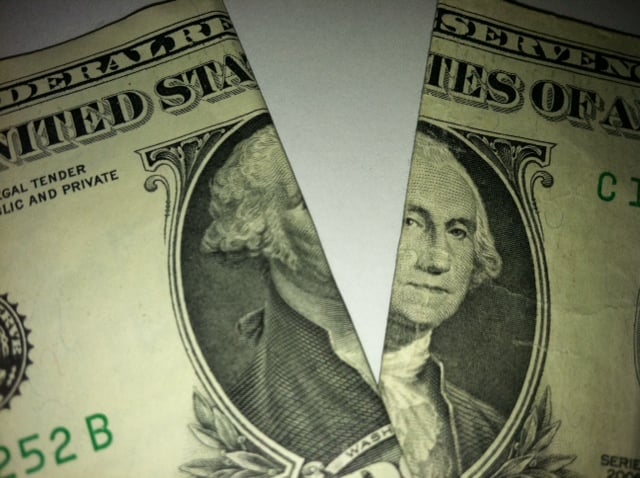The Five Most Overvalued DJIA Stocks of 2013 (BAC, HPQ, JNJ, TRV, XOM, VZ)
January 4, 2013 by Jon C. Ogg
Here we identify the five most vulnerable (or least valuable) of the 30 DJIA stocks. These include Bank of America Corp. (NYSE: BAC), Hewlett-Packard Co. (NYSE: HPQ), Johnson & Johnson (NYSE: JNJ) and The Travelers Companies Inc. (NYSE: TRV). We had a virtual tie between Exxon Mobil Corp. (NYSE: XOM) and Verizon Communications Inc. (NYSE: VZ) until we identified which is better for investors relatively.
As far as how we identified the least valuable and most undervalued DIJA stocks, this was done in the same manner as how we calculated our DJIA 14,590 calculation. That is, by using the Thomson Reuters consensus price target. We also showed issues such as the dividend yield and market capitalization on each. We have added color on these as well.
Read Also: The Five Most Undervalued DJIA Stocks of 2013
Bank of America Corp. (NYSE: BAC) was the best performer of all 30 DJIA components in 2012. With gains of more than 100%, the stock is now overvalued, according to Wall St. analysts. Meredith Whitney may have recently upgraded Bank of America, but the year-end consensus price target of $10.60 implies a negative return of almost 9%. There is at least something positive to say here, and that is that analysts are ratcheting their targets slightly higher already. Thomson Reuters already has lifted its consensus mean target to $11.13. Bank of America only yields 0.3% because it has not been allowed to raise its dividend. What if that changes in 2013?
Hewlett-Packard Co. (NYSE: HPQ) was the worst story of all 30 DJIA stocks in 2013. Unfortunately, what was bad is expected to get worse in 2013. With a downside price target of $13.53, HP shares are now expected to fall just over 5%, even with this yielding 3.5% now. HP’s woes do not stop with the Autonomy acquisition. Meg Whitman has fired many employees but warned that a real turnaround might not take hold until all the way into 2016. We expect more asset sales and ultimately more layoffs. HP’s position was not helped out after it became known that famous short sellers are continuing to bet against this PC and IT-services giant.
Johnson & Johnson (NYSE: JNJ) is at least expected to gain 7.2% in 2013 to rise to $75.14. With a 3.4% dividend, this is one of the smallest expected gainers for the year. This might not be such a big surprise, but it is interesting that Johnson & Johnson was so close to its 52-week high at the end of 2012. With so many former quality control issues, and with this market cap already up at $196 billion, it is a real question as to what could be the next driver. Johnson & Johnson has accumulated so many medical units that perhaps its next way to generate value is to identify ways of divesting assets.
The Travelers Companies Inc. (NYSE: TRV) is expected to rise by only 7.6% to $77.26 in 2013. That would represent a 52-week high, but this one also has a yield of 2.6%. Note that the street high target is actually all the way up at $87.00, and shares are currently very close to all-time highs. This insurance provider and financial services giant is not tied into health care, so it has been immune to some of the ongoing risks. Travelers held up rather well in the recession, but many investors do not even know it is one of the 30 DJIA components.
As mentioned, for the fifth “least valuable” of the 30 DJIA stocks, we actually had a tie between Exxon Mobil Corp. (NYSE: XOM) and Verizon Communications Inc. (NYSE: VZ). Analysts expect both to gain only about 7.9% in 2013. With the dividends being grossly different, Verizon outshines Exxon, with its 4.8% dividend versus 2.7% from Exxon. Verizon also does not have the inherent risk of falling oil and gas prices that Exxon has. Exxon is also worth more than $400 billion, versus $125 billion for Verizon. Of the two vying for the fifth spot among the least valuable DJIA stocks, Exxon Mobil would be the de facto “winner” here.
Consensus estimates came from Thomson Reuters; the price, dividend and historical prices came from Yahoo! Finance. Here is how we came to a DJIA peak target price of 14,590 for a gain of 11.34% in 2013.
Sponsored: Want to Retire Early? Here’s a Great First Step
Want retirement to come a few years earlier than you’d planned? Or are you ready to retire now, but want an extra set of eyes on your finances?
Now you can speak with up to 3 financial experts in your area for FREE. By simply clicking here you can begin to match with financial professionals who can help you build your plan to retire early. And the best part? The first conversation with them is free.
Click here to match with up to 3 financial pros who would be excited to help you make financial decisions.